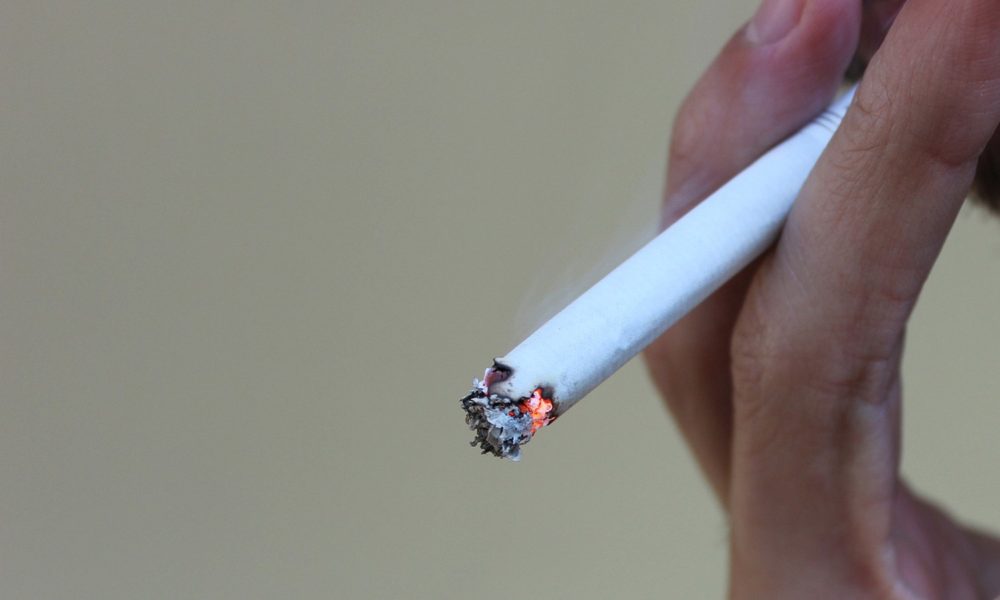Earlier this month, the Biden administration announced its intent to ban the sale of menthol flavored cigarettes. If finalized, public health experts and anti-tobacco advocates believe this would be a big step forward in tobacco regulation and could help address health disparities experienced by communities of color.
The harms caused by flavored cigarettes, including menthol, have been known for decades as they increase the likelihood that someone will start smoking, especially for teens. Menthol is a flavor derived from mint plants or developed in a lab that has a cooling, soothing affect that reduces the harshness of smoking. Not only has menthol been known to make it easier to start smoking but also can make it more difficult to quit.
For decades, the tobacco industry has targeted marketing of menthol cigarettes to Black communities and other marginalized groups. Currently about 85% of Black cigarette smokers smoke menthol cigarettes compared to 30% of white smokers. Women, youth, and members of the LGBTQ+ community are also more likely to smoke menthols.
Because menthol cigarettes make up about a third of cigarette sales, a ban constitutes a significant threat to tobacco industry profits. This is why the tobacco industry has fought so hard to stave off regulation, using strategic disinformation campaigns to accomplish their goal. The Biden administration has an opportunity to implement this science-based policy and set the record straight on the harms of this product.
The facts
The facts about the disproportionate use and impact of menthol cigarettes on communities of color and low-income communities have been known for a while. Here is what we know based on years of research:
- Tobacco kills. 480,000 deaths are attributed to cigarette smoking each year in the US
- The list of diseases caused by smoking is LONG and includes cardiovascular disease, cancer, COPD, emphysema and more
- Menthol and flavored cigarettes have been shown to attract children and teens because of its soothing affect as well as years of targeted advertising
- Industry documents and research show that tobacco companies have purposefully targeted marketing and sales of menthol cigarettes to youth, BIPOC communities, the LGBTQ+ community and other traditionally marginalized groups
- The CDC estimates that upwards of 90% of Black adult smokers started with menthol cigarettes compared to just 40% of white adult smokers
- Teens, women, LGBTQ+ and Black individuals are more likely to smoke menthol cigarettes than other groups.
- Some research shows that menthol cigarette use may make it more difficult to quit smoking
Menthol regulation: Many have tried. Few have succeeded.
Catching health policy up to the large body of science on the harms of tobacco has long been an uphill battle. While decades of research has shown the detrimental affects of tobacco and flavored tobacco products, the tobacco industry has used every play in the disinformation playbook to bury or manipulate the science to prevent regulations from moving forward.
When it comes to bans on menthol cigarettes, there have been four attempts within the last 15 years:
2009 – From 2000 to 2009, the FDA did not have the power to regulate tobacco after a 2000 Supreme Court case decided Congress needed to award the FDA this power. In 2009, the Obama administration signed the Family Smoking Prevention and Tobacco Control Act giving the FDA power to regulate tobacco products. That same year the US banned flavored cigarettes, but menthol cigarettes were excluded from the ban due to successful lobbying by tobacco companies.
2011 – FDA’s Tobacco Products Scientific Advisory Committee was directed to investigate menthol cigarettes. The resulting report showed that menthol cigarettes have adverse health affects on public health in the US. Among their findings, “TPSAC estimated that by 2020, 17,000 more premature deaths will occur and approximately 2.3 million more people will have started smoking, solely because of the availability of menthol cigarettes.” In the report TPSAC recommended the removal of menthol cigarettes from the marketplace citing the benefit it would have for public health in the US. The Obama administration took no action to ban menthol cigarettes.
2013 – A group of prominent national health organizations filed a citizen petition urging the FDA to ban menthol cigarettes. No action was taken following the petition. Eventually, in June 2020, a subset of the groups who initially filed the petition filed a lawsuit against the FDA. Those involved in the lawsuit included the African American Tobacco Control Leadership Council, Action on Smoking and Health, the American Medical Association and the National Medical Association.
2018 – Former FDA commissioner Scott Gottlieb announced the intention to ban menthol cigarettes, but strong opposition from Representative Richard Burr from North Carolina eventually persuaded the Trump Administration to kill the proposed ban. Representative Burr was no doubt persuaded to oppose the ban by the fact that the tobacco industry employs many North Carolina residents including Mr. Burr’s two sons who work for Altria and RJ Reynolds.
Public health advocates seem more optimistic this time around, but even if the ban is carried out, it will take years to fully implement. Based on past behavior, it’s a given that tobacco companies will lobby hard to prevent or delay implementation.
Meanwhile, it is being met by Big Tobacco’s usual misinformation tactics. They claim the rule would hurt the Black community and users of menthol cigarettes more generally by “criminalizing” menthol cigarettes and harm police-community relations; however, this is simply not true. The ban would prohibit the production and sale of menthol cigarettes in the US; Possession and consumption would not be prohibited.
*fingers crossed*
Passage of this long-awaited ban on menthol cigarettes would be a massive win for science and public health. The science has been telling us for decades that a ban on menthol cigarettes could lead to huge improvements in public health. One public health study said that a ban could prevent 630,000 deaths over the next 40 years — more than a third of them African American.
If and when the rule is issued, it’s important that decisionmakers continue to fight for tougher regulations and restrictions on flavored nicotine products. The tobacco industry has been working for years to move their business from traditional cigarettes and cigars to e-cigarettes, vaping devices, and other Electronic Nicotine Delivery Systems (ENDS). These devices are sold with similarly flavored, nicotine filled e-juices. Science-informed policies are needed on these products to prevent a prolonged game of nicotine delivery whack-a-mole.
We cannot let Big Tobacco get another generation hooked on nicotine. The Biden administration must do what previous administration have failed to do: listen to the overwhelming science and ban these dangerous products once and for all.

